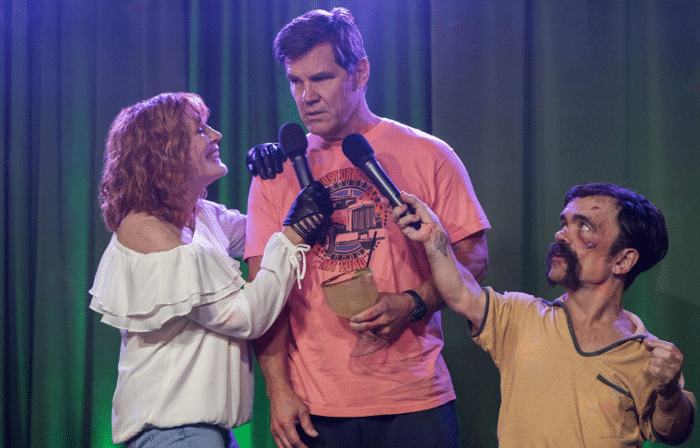

Is Go Topless Day Beautiful Empowerment or Pointless Bullsh*t?
By Vivian Kane | Miscellaneous | August 25, 2015 |
By Vivian Kane | Miscellaneous | August 25, 2015 |
This article contains NSFW images of women’s breasts, which we all know are inherently sinful appendages. It’s, like, science.
This past Sunday, August 23rd, was the official Go Topless Day in the U.S. and beyond. The idea behind the day is pretty self-explanatory. It encourages women to go topless in order to protest the inequality in how we view men and women’s bodies. As the founder of the movement (who, by the way, is also the founder of a religion that believes life was put on Earth by extra-terrestrials, but that is an entirely different article) puts it, “As long as men are allowed to be topless in public, women should have the same constitutional right. Or else, men should have to wear something to hide their chests.”
This issue has been getting a lot of attention lately, since Chrissy Teigen, Miley Cyrus, and a bunch of other women (plus Matt McGorry!) have taken up arms nips against Instagram’s gender-specific nipple banning policies. The way this issue has been approached, this woman’s sign from the Los Angeles march puts it succinctly:

The idea is not that women necessarily want to desexualize the female body. If you’ve seen a picture of Chris Pratt’s abs, you know no one could argue that a man’s torso is definitively unsexual. But women’s nipples are seen as something to be hidden, something inherently salacious. When in reality, these are our bodies. And if a woman feels comfortable enough to walk around topless, and you feel weird about it, maybe it’s time to shift the blame for those feelings off of the woman.
Now, the empowerment that can come by reclaiming your own body, even in as simple an act as taking your shirt off in public shouldn’t be dismissed. Tig Notaro has talked about the liberating effect performing stand-up topless had on her following her double mastectomy. She recognized that act as both being a statement but also being “silly.” Because hey, they’re just boobs. A lot of women participated in the Go Topless Day marches around the country— and world, although the UK marches seemed to just be one topless woman with a megaphone whom no one gave a crap about:

And many of these women have reported feeling liberated, feeling camaraderie with other women, feeling stronger and more in control than they’re maybe used to feeling. And not every woman was there for the same reason. Not everyone was focused on public indecency laws or Instagram policies. One participant who wrote up her story at Hello Giggles says she went to prove to herself “that our bodies don’t have to adhere to a monolithic beauty standard.” This kind of gathering is beautiful because it allows for any number of personal motivations.
The problem with these types of gatherings, of course, is that once you do your part, once you’ve stood up and taken control of your body, you have no control over the outside reaction. Unsurprisingly, Go Topless Day has gotten a lot of criticism— and not just for being founded by a dude whose alien-based cult uses its “liberal views of sexuality” to attract priests from other religions. Instead, the criticism can be summed up by this picture:

And here’s a gross photo from New York event:

And one from Hampton Beach:

For women in most scenarios, wanting to feel empowered by owning your sexuality means that there will be a sidewalk full of men with iPhones, treating you as topless eye candy. Does this invalidate your feelings? Of course not. Naysayers will naysay that topless street fairs aren’t going to inspire lawmakers to change anything, and Miley Cyrus’ hashtags aren’t going to alter the internet’s nipple policies. So when we look at these organized events, do we look at the “failings” of the lack of institutional change? Do we point to the gross dudes getting off on a free show? Is the sum total of a large number of women’s positive individual experiences enough to justify the previous two? It should be, right?
← Company Insists Caitlyn Jenner Costume Isn't Offensive, Is Brain-Meltingly Wrong | The Internet Needs to Stop Saying that Taylor Swift Is in a 'Feud' with Other Musicians →
More Like This
What It's Like Buying Anything In 2024
It's Happening: Oasis are Reuniting!
How Do You Feel Nostalgic For Something You Never Experienced
Can We Put All Memes to Orchestral Music From Now On Please?
Hot Strike Summer 2024: Here’s Why SAG-AFTRA is Striking Video Game Companies

Three Trailers: Polymorphic Pattinsons Vs. Bonkers 'Brothers' Brolin and Dinklage
A New Series Explores the ‘Chaos’ Behind Superhero Franchises
Robert De Niro Couldn't Remember His Lines While Shooting 'Joker'
RFK, Jr. Had an Affair with 31-Year-Old Journalist, Olivia Nuzzi
‘We Live In Time’ Inspired Florence Pugh to Prioritize Her Love Life
Elle King Says Rob Schneider's Apology 'Means Nothing'
Pajiba Love

Where Were You When You Learned About The Penguin's Dong?
Reviews